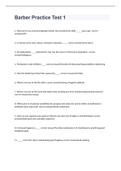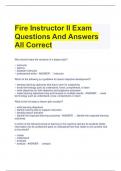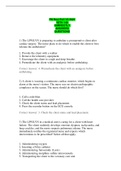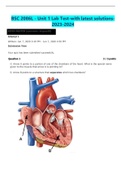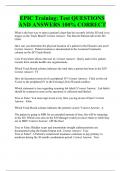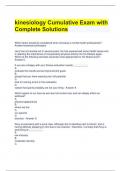Ondernemingsfinanciering & Vermogensmarkten Hoorcollege 1
Expected cash flows and all-equity fiction
All-equity fiction: Je moet doen alsof er uitsluitend eigen vermogen is uitsluitend voor de berekening
van de expected cash flows, ook al weet je dat er wel vreemd vermogen is
Why do we determine expected cash flows using this all-equity fiction?
This is a profound question, which relates to:
o Should a company be assessed at its ability to undertake excellent real projects, or at
its qualities to make smart financial decisions?
o De mate waarin ondernemingen in staat zijn om project hoge cash flows te
realiseren is veel belangrijker dan het slim financieren. Er is geen een onderneming
veel waard geworden door te zeggen ‘onze projecten zijn 3x niks maar we kunnen
wel financieren’. Financieren is niet je core business.
Many people (including me) support the first view
But then the relevant expected cash flow definition should NOT include financial items such
as interest costs
Therefore this all-equity fiction
HOOFDSTUK 14
Condensed Balanced Sheet verder/anders rangschikken Adjusted Balance Sheet
Adjusted Balance Sheet:
Terminology
This defines (net) productive assets as closely as possible. Netto productieve activa worden
benadrukt.
This asset total is financed by capital market investors
Using explicit financing agreements or securities: equity, bonds, loans, bank credit
Unlevered onderneming: alleen maar eigen vermogen
Levered: met vreemd vermogen
Unlevered equity: equity in een onderneming waar geen vreemd vermogen is
Unlevered equity: equity in a firm with no debt
The unlevered equity cash flows are equal to that of the firm
Levered equity: equity in a firm that also has debt outstanding
Law of one price: als iets hetzelfde is heeft dat ook dezelfde prijs
,Levered equity cash flows are not only smaller, but the spread in levered equity returns is also
higher: levered equity is more risky
So levered equity cash flows may not be discounted at the same (unlevered) discount rate
,Ondernemingsfinanciering & Vermogensmarkten Hoorcollege 1
rwacc is equal in both the unlevered and levered financing packages
The suggested advantage of cheaper debt is annihilated by a compensating rise in the cost of levered
equity, such that for the market value of the firm
VU is de marktwaarde van een onderneming die unlevered is (alleen maar eigen vermogen is)
VL is de marktwaarde van een onderneming waar naast eigen vermogen ook vreemd vermogen is
(levered value)
EU is (unlevered) eigen vermogen
EL is de equity met eigen en vreemd vermogen
There is no net present value to be created by choosing whatever financing package
Door slim te financieren is er geen extra waarde (NPV) te genereren door de onderneming
Je kunt geen waarde aan de onderneming toevoegen door slim te financieren
Dit is het beroemde Proposition I van Modigliani and Miller (MM I)
Modigliani-Miller I (MM I)
MM I holds under a set of conditions that defines a perfect capital market
o Investors and firms can trade the same set of securities at competitive market prices
equal to the present value of their future cash flows
o There are no taxes, transactions costs or issuance costs associated with security
trading
o A firm’s financing decisions do not change the cash flows generated by its
investments, nor do they reveal new information about them
In such a setting, the Law of One Price implies that leverage will not affect the total value of
the firm
o Total firm value is equal to the market value generated by its assets and is not
affected by its choice of capital structure
o Leverage only changes the allocation of cash flows between debt and equity, without
altering the total cash flows of the firm
Levered recapitalization (herkapitalisatie), de leverage verhouding aanpassen
When a company uses borrowed funds:
To pay a large special dividend
Or to repurchase a significant amount of outstanding shares
Symbols and terminology
, Het maakt niet uit hoe je gefinancierd bent onder perfecte omstandigheden, het bestaan van
vennootschapsbelasting doorbreekt deze perfecte markt echter
Linear relationship between rE and D/E
Cost of capital for capital budgeting
Recall once more for an unlevered firm:
o All of the free cash flows generated by the firm’s assets are paid out to its
equityholders
o Market value, risk and cost of capital for the firm’s assets and its equity coincide
rU = rA
For a levered firm:
o There is no change in asset free cash flows, so r U is still equal to rA
o MM I states that rwacc continues to be equal to rU, since increased leverage adjusts rE
accordingly
Net income (available to equityholders) is lower with leverage, so levered equity value is lower than
unlevered equity value
Als je met vreemd vermogen bent gefinancierd hoef je minder belasting te betalen
Expected cash flows and all-equity fiction
All-equity fiction: Je moet doen alsof er uitsluitend eigen vermogen is uitsluitend voor de berekening
van de expected cash flows, ook al weet je dat er wel vreemd vermogen is
Why do we determine expected cash flows using this all-equity fiction?
This is a profound question, which relates to:
o Should a company be assessed at its ability to undertake excellent real projects, or at
its qualities to make smart financial decisions?
o De mate waarin ondernemingen in staat zijn om project hoge cash flows te
realiseren is veel belangrijker dan het slim financieren. Er is geen een onderneming
veel waard geworden door te zeggen ‘onze projecten zijn 3x niks maar we kunnen
wel financieren’. Financieren is niet je core business.
Many people (including me) support the first view
But then the relevant expected cash flow definition should NOT include financial items such
as interest costs
Therefore this all-equity fiction
HOOFDSTUK 14
Condensed Balanced Sheet verder/anders rangschikken Adjusted Balance Sheet
Adjusted Balance Sheet:
Terminology
This defines (net) productive assets as closely as possible. Netto productieve activa worden
benadrukt.
This asset total is financed by capital market investors
Using explicit financing agreements or securities: equity, bonds, loans, bank credit
Unlevered onderneming: alleen maar eigen vermogen
Levered: met vreemd vermogen
Unlevered equity: equity in een onderneming waar geen vreemd vermogen is
Unlevered equity: equity in a firm with no debt
The unlevered equity cash flows are equal to that of the firm
Levered equity: equity in a firm that also has debt outstanding
Law of one price: als iets hetzelfde is heeft dat ook dezelfde prijs
,Levered equity cash flows are not only smaller, but the spread in levered equity returns is also
higher: levered equity is more risky
So levered equity cash flows may not be discounted at the same (unlevered) discount rate
,Ondernemingsfinanciering & Vermogensmarkten Hoorcollege 1
rwacc is equal in both the unlevered and levered financing packages
The suggested advantage of cheaper debt is annihilated by a compensating rise in the cost of levered
equity, such that for the market value of the firm
VU is de marktwaarde van een onderneming die unlevered is (alleen maar eigen vermogen is)
VL is de marktwaarde van een onderneming waar naast eigen vermogen ook vreemd vermogen is
(levered value)
EU is (unlevered) eigen vermogen
EL is de equity met eigen en vreemd vermogen
There is no net present value to be created by choosing whatever financing package
Door slim te financieren is er geen extra waarde (NPV) te genereren door de onderneming
Je kunt geen waarde aan de onderneming toevoegen door slim te financieren
Dit is het beroemde Proposition I van Modigliani and Miller (MM I)
Modigliani-Miller I (MM I)
MM I holds under a set of conditions that defines a perfect capital market
o Investors and firms can trade the same set of securities at competitive market prices
equal to the present value of their future cash flows
o There are no taxes, transactions costs or issuance costs associated with security
trading
o A firm’s financing decisions do not change the cash flows generated by its
investments, nor do they reveal new information about them
In such a setting, the Law of One Price implies that leverage will not affect the total value of
the firm
o Total firm value is equal to the market value generated by its assets and is not
affected by its choice of capital structure
o Leverage only changes the allocation of cash flows between debt and equity, without
altering the total cash flows of the firm
Levered recapitalization (herkapitalisatie), de leverage verhouding aanpassen
When a company uses borrowed funds:
To pay a large special dividend
Or to repurchase a significant amount of outstanding shares
Symbols and terminology
, Het maakt niet uit hoe je gefinancierd bent onder perfecte omstandigheden, het bestaan van
vennootschapsbelasting doorbreekt deze perfecte markt echter
Linear relationship between rE and D/E
Cost of capital for capital budgeting
Recall once more for an unlevered firm:
o All of the free cash flows generated by the firm’s assets are paid out to its
equityholders
o Market value, risk and cost of capital for the firm’s assets and its equity coincide
rU = rA
For a levered firm:
o There is no change in asset free cash flows, so r U is still equal to rA
o MM I states that rwacc continues to be equal to rU, since increased leverage adjusts rE
accordingly
Net income (available to equityholders) is lower with leverage, so levered equity value is lower than
unlevered equity value
Als je met vreemd vermogen bent gefinancierd hoef je minder belasting te betalen

